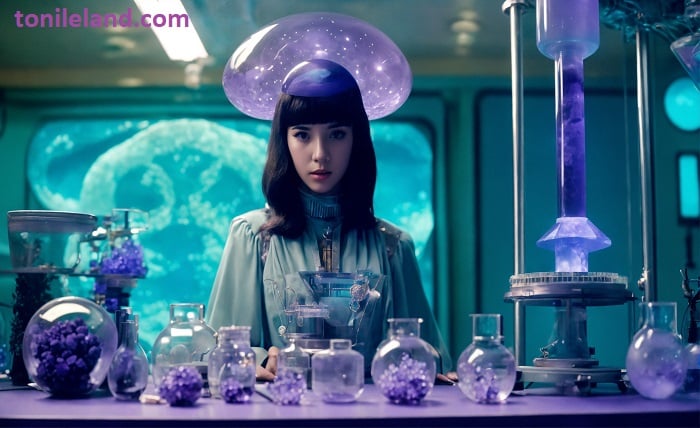Haunting Lullaby of Nguyen Duy Tri’s Just Lullaby

Nestled within the unsettling pages of “Acid Madness” (2023), Nguyen Duy Tri’s “Just Lullaby” is not merely a story; it’s a symphony of shadows, a melody of paranoia that burrows deep into the subconscious. In this dystopian cityscape pulsating with the rhythmic thrum of manipulated music, Tri crafts a narrative that explores the chilling intersection of sound, control, and the very fabric of reality. Through the eyes of An, a young musician struggling to retain her autonomy in a world where music is weaponized, the story takes us on a mind-bending journey through warped melodies and fractured memories, blurring the lines between what is real and what is merely an orchestrated illusion.
A City Ensnared by Melody
Tri’s dystopia is not defined by brutal regimes or oppressive technology; it’s woven from the threads of sound itself. The “Symphony Corporation” wields music as a tool of control, broadcasting hypnotic lullabies that reshape emotions, dictate moods, and even implant false memories. An, immune to this sonic manipulation, becomes an anomaly, a threat to the Corporation’s orchestrated harmony. She finds solace in the forbidden sounds of “pure music,” untainted by the Corporation’s manipulations, which become her weapon and her refuge in a world drowning in manufactured melodies.
Sound as Weapon and Savior
Music, in “Just Lullaby,” transcends its usual role as entertainment or artistic expression. It becomes a weapon of mass manipulation, a tool for erasing the past and controlling the present. Yet, it also serves as a beacon of hope, a reminder of the power of authenticity and the inherent human need for individual expression. An’s ability to create and hear pure music becomes a symbol of resistance, a counterpoint to the Symphony Corporation’s oppressive symphony.
The Erosion of Reality
One of the most unsettling aspects of the story is the way the manipulated music blurs the lines between reality and illusion. As An navigates the city, she begins to question her own memories, unsure of what is true and what is a consequence of the omnipresent lullabies. This constant uncertainty keeps the reader on edge, mirroring An’s internal struggle and questioning the very nature of perception in a world where sound can be weaponized to warp reality.
A Song of Resistance in the Discord
Despite the pervasive sense of paranoia and uncertainty, An refuses to surrender. She forms alliances with other rebels, musicians and artists who seek to reclaim their agency and preserve the power of pure music. Together, they orchestrate their own counter-melodies, defiant symphonies that disrupt the Corporation’s control and offer a glimmer of hope amidst the suffocating sonic landscape.
A Lingering Echo of Dissonance
The ending of “Just Lullaby” remains ambiguous, leaving the ultimate fate of An and the rebellion unresolved. Yet, the story doesn’t need a clear resolution to be impactful. It lingers in the reader’s mind like a discordant melody, a haunting reminder of the fragility of free will, the insidious power of manipulation, and the enduring human spirit’s fight for autonomy, even in the face of a seemingly all-encompassing symphony of control.
Conclusion
Nguyen Duy Tri’s “Just Lullaby” is not just a dystopian fiction; it’s a chilling symphony of paranoia, a haunting melody that resonates long after the final note fades. By weaving sound into the very fabric of his narrative, Tri forces us to confront the unsettling possibilities of sonic manipulation and its insidious implications for our perception of reality and free will. While the story’s ambiguous ending leaves us dangling in the discord, it’s in this very state of uncertainty that its true power lies.
“Just Lullaby” serves as a stark reminder that the tools we use for self-expression, for joy, and for connection can also be twisted into instruments of control. It compels us to question the increasingly pervasive influence of sound in our lives, from the manipulative algorithms of streaming platforms to the carefully curated soundscapes of urban spaces. An’s resistance, though precarious and uncertain, offers a glimmer of hope, a defiant counterpoint to the orchestrated symphony of control.
FAQ
- What genre is “Just Lullaby”?
While categorized as science fiction within “Acid Madness,” the story blends elements of dystopian fiction, psychological thriller, and even elements of musical fantasy, creating a unique and unsettling narrative experience.
- Is the story fast-paced and action-packed?
The focus lies more on internal conflict and psychological exploration rather than external action. The suspense builds gradually, fueled by the constant sense of paranoia and the ever-present threat of sound manipulation.
- Is there a clear protagonist and antagonist?
The lines are blurred. An represents the individual fighting for autonomy and self-expression, while the Symphony Corporation embodies the forces of control and manipulation. However, the story acknowledges the complexities of each side, avoiding simplistic portrayals of good versus evil.
- Does the story have a happy ending?
The ending is deliberately ambiguous, leaving the future of An and the rebellion uncertain. This open-ended conclusion invites the reader to actively engage with the themes and draw their own interpretations.




